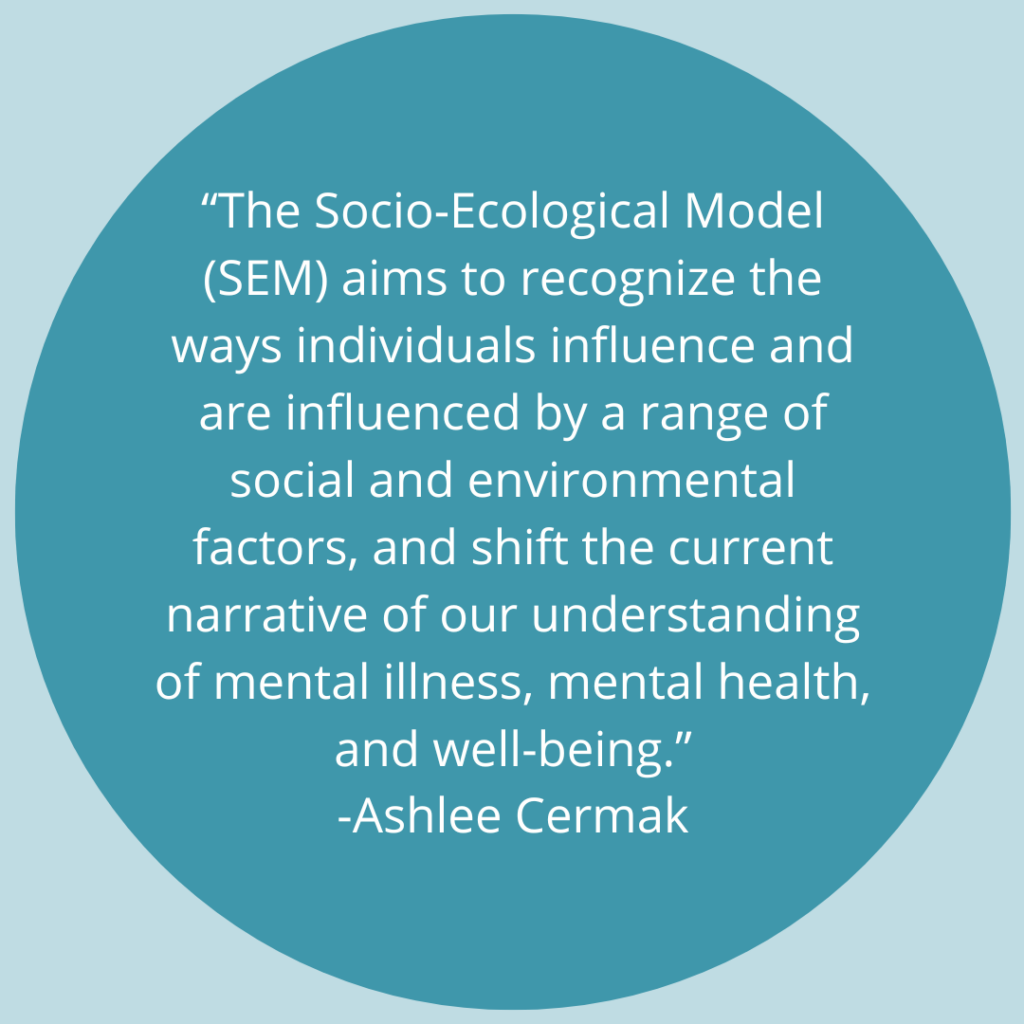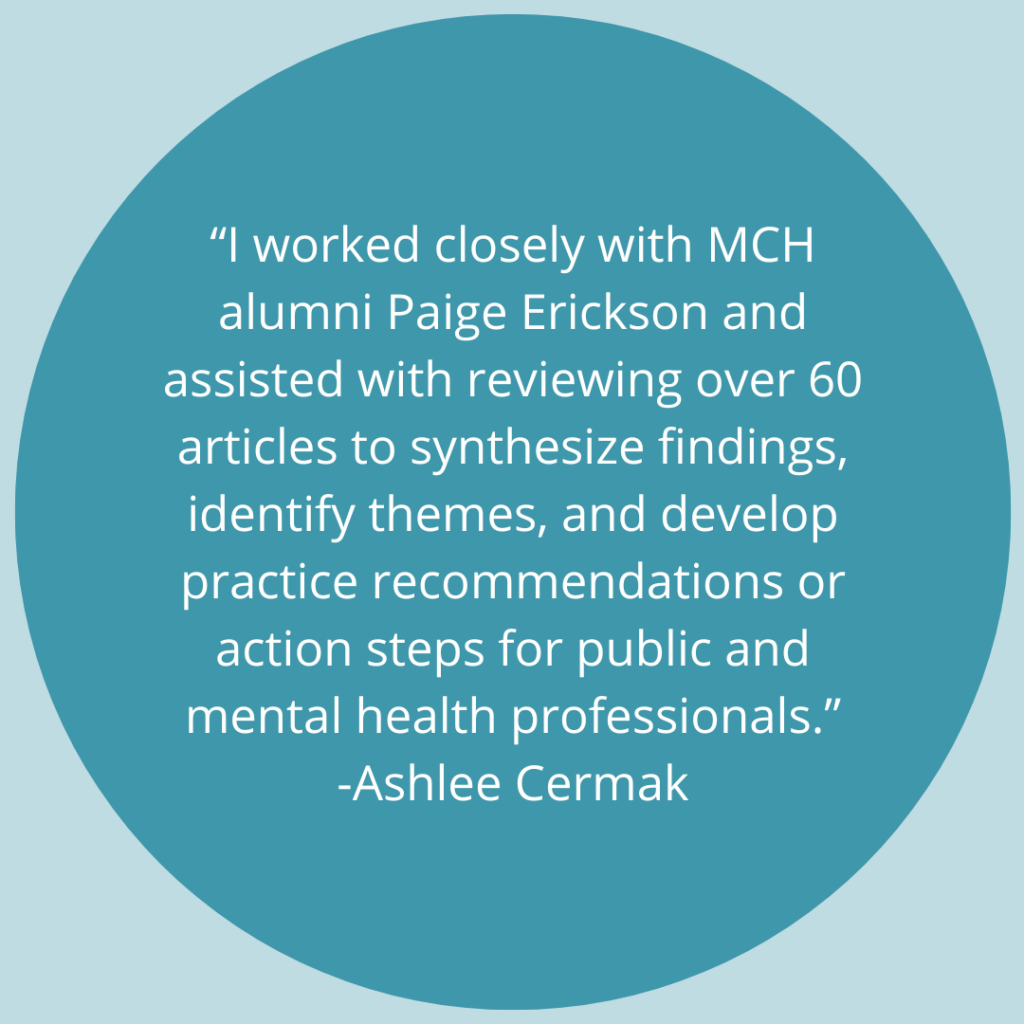#UMNMCH student Ashlee Cermak (MPH 2026) reflects on the experiences that led her to MCH and her internship with the collaborative Socio-Ecological Model of Mental Health and Well-being project. Ashlee conducted extensive literature reviews to identify environmental influences on mental health. She hopes that her work synthesizing and presenting this important mental health framework will lead to a broader understanding of the many factors influencing our mental health and well-being.
Path to the Maternal and Child Health Program
My journey to Maternal and Child Health (MCH) began at the start of the COVID-19 pandemic. I was not only working in disability services as a division director for positive behavior support services, but I also became a first-time mom. The intersection of these immense experiences allowed me to assess my life and consider what I was truly passionate about. So tremendously changed by parenthood, my entire worldview shifted and now I saw everything through the eyes of a mother. At this time, my own experiences with mental health and mental illness mirrored the broader landscape of countless stories of parents struggling to care for their children who had little to no support during the pandemic. I wanted to scream, “Where’s the village?!” In my gut, I felt deeply compelled to help moms. We’re not supposed to raise children in isolation (nor are we grown-ups meant to live in isolation), and I knew a broad understanding of the many influences which comprise one’s community, such as education, housing, environment, public transportation, food access and more, had to be part of this vision for my future. I chose to apply to the University of Minnesota (UMN) MCH Program because of its magnificent alignment with my story, values, and what I want to do with my life. Additionally, I knew parenting and working full-time meant I could only pursue grad school if the program was offered fully online. The online MCH degree at UMN sets this program apart from many other schools for its availability to non-traditional students like me. I’m so grateful to be able to participate in such a rigorous and engaging MCH Program from home.
Socio-Ecological Model (SEM) of Mental Health and Well-being
For my deployment, I have been serving as the Mental Health Promotion Intern working on the Socio-Ecological Model (SEM) of Mental Health and Well-being. This project is a collaboration with a multidisciplinary team of professionals from the UMN Center for Leadership Education in Maternal and Child Public Health, the UMN Extension Department of Family, Health and Wellbeing, and the Minnesota Department of Health (MDH). The original ecological model of human development was first developed by psychologist Urie Bronfenbrenner in the 1970s as a way to understand the interconnected levels of social and environmental influences and their impact on one’s overall health and development (1979).
In 2021, the original team, which included professionals from the UMN Center for Leadership Education in Maternal and Child Public Health, UMN Extension Department of Family, Health and Wellbeing, MDH, and MCH alumni Teale Greylord, created a visual model to demonstrate how individual, family, organization, community, policy, and societal factors impact a person’s mental health and well-being. The model aims to recognize the ways individuals influence and are influenced by a range of social and environmental factors, and shift the current narrative of our understanding of mental illness, mental health, and well-being. Presently, there is an overly simplistic, individualistic, and reductive perspective around mental illnesses that exists both clinically and socially and our project encourages a broader understanding which recognizes the influence of family and relationships, organizations, communities, policies/laws, and society (Biglan et al., 2013). The project also incorporates the ideas of American sociologist Corey Keyes (2002), which explores a dynamic approach to mental health as not only centered on a clinically recognized mental illness, but consideration of mental well-being; with support, people with mental illness may flourish and alternatively, without support, people without any mental illness may languish.
In 2020 (prior to my deployment), the SEM team conducted a rapid literature review for factors that impact mental health and well-being. I joined the team in September 2023 while an extensive scoping review was underway to identify further evidence for the societal determinants of health. Articles that explored mental flourishing, thriving, resilience, and protective factors were included in the review. I worked closely with MCH alumni Paige Erickson and assisted with reviewing over 60 articles to synthesize findings, identify themes, and develop practice recommendations or action steps for public and mental health professionals.
Presenting the SEM Poster at MPHA
We created an updated SEM infographic that included seven societal themes. This updated version also included corresponding action steps for public or mental health professionals to consider in their work including allocating emergency resources, dispatching mental health professionals to mental health crises, and promoting connectedness. This updated iteration of the SEM was presented in poster form by Paige and I at the Minnesota Public Health Association’s Annual Conference in April 2024. It was thrilling to show our work and meet other public health professionals to discuss the importance of shifting the narrative of mental health and well-being. Also during this time, Paige led the SEM team in writing an extensive report detailing the results of the scoping review on the societal factors influencing mental health and well-being, presenting the updated model. I assisted with editing, proofing, and incorporating the review’s results into the report. In July 2024, the report, Societal-level Determinants of Mental Health and Well-being: A Social-Ecological Model and Report, was completed.
What’s Next: Policy Level
Starting in Fall 2024, the SEM group is focusing its efforts on determining how to dig into the next level – policy. At this point, I’ve stepped into the lead position of conducting a rapid review on policy determinants of mental health and well-being. In addition to the review, I plan on creating a policy brief as my final product. The projected timeline for completion, and the end of my deployment, is May 2025.
Beyond the Deployment
My deployment as a Mental Health Promotion Intern has provided me with a challenging opportunity to develop my research and communication skills to present evidence of the socio-ecological model of mental health and well-being to a broad audience. My hope is this project will be seen by audiences beyond public health professionals. For MCH populations specifically, this model could be used in educating families on parenting styles, ACEs, and the positive impacts of promoting intergenerational connection. Mental health and mental illness impact everyone, and I’m motivated to communicate my knowledge base of the many impacts on health in innovative ways to honor others’ experiences and build community. My personal, professional, and academic experiences have reinforced my conviction that mental health and well-being is just as important as physical health. Moreover, it’s my opinion that overly individualistic attitudes about mental health are harmful as they ignore the broader picture of environmental influences. There is a bigger picture to mental health than our individual behaviors. Partnership between public health and other sectors (such as education, housing, public transportation, environmental agencies, and traditional healthcare settings) is crucial to ensure our efforts are successful in responding to the unique needs of different communities, building resilience, and promoting health.
REFERENCES
Biglan, A., Flay, B. R., Embry, D. D., & Sandler, I. N. (2013). The critical role of nurturing environments for promoting human well-being. The American psychologist, 67(4), 257–271. https://doi.org/10.1037/a0026796
Bronfenbrenner, U. (1979). The Ecology of Human Development: Experiments by Nature and Design. Cambridge, MA: Harvard University Press.
Keyes, C. L. M. (2002). The mental health continuum: From languishing to flourishing in life. Journal of Health and Social Behavior, 43(2), 207–222. https://doi.org/10.2307/3090197
BIO
Ashlee Cermak will graduate in Summer 2026 with an MPH in Maternal and Child Health. Ashlee received her BA in Sociology of Law, Criminology and Deviance, and Psychology, from the University of Minnesota, Twin Cities, and has worked in disability services for over 15 years. She is currently working as a social worker with Hennepin County. Ashlee is deployed as a mental health promotion intern for the Socio-Ecological Model of Mental Health and Well-being project in partnership with the Center for Leadership Education in Maternal and Child Public Health, Minnesota Department of Health, and University of Minnesota Extension. In her spare time, Ashlee enjoys spending time with her family, reading, running, and vintage shopping.
–Read Student Spotlight archives
Interested in learning more about getting a degree in MCH? Visit our MCH Program page for more information.
#UMNMCH #UMNproud #UMNdriven


